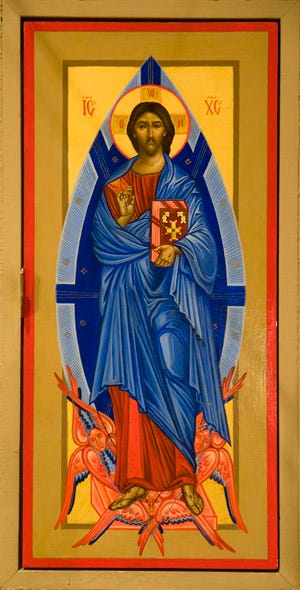December is waning. The side-eye of winter sunlight continues to downshift, receding quickly with the final days of Advent and another year. The holidays hold an odd mix of endings and beginnings all crunched together, and for a contemplative soul it often feels like too much to take in. Before we know it the political wrestling match of 2024 will be upon us, and I confess I am not ready. Yet with Advent grounding me, I am reminded that the broken and staunchly held political hopes of each party are simply too small. Those siloed dreams are not big enough.1 Truly, there is something more dire and more expansive to hope for, something I often forget is “at hand.”
Each year the church calendar rolls its anchored rhythms through the changeable circumstances of my life. Each year I search the depths of ancient Scriptures and liturgies and inevitably stumble into “founding, unfound Wisdom, finding me.”2 In her newest book “Advent: The Season of Hope,” Tish Harrison Warren writes,
“When I first began to practice Advent, my focus was almost entirely on preparing for Christmas. I was surprised to discover, however, that Advent is uncomfortably and unavoidably apocalyptic, more concerned with a vast cosmic battle than dashing through the snow in a one-horse open sleigh.”3
Tish’s surprise feels familiar to me. It has only been in recent years that I have found myself looking both historically backwards and hopefully forwards.
Last weekend I had the opportunity to attend a full choral performance of Handel’s “Messiah”. Although I grew up listening almost exclusively to classical music, I had not attended an immersive experience like this in years, especially one with such theological significance. My modern western mind automatically associated the “Messiah” with the Christmas season. After all, the choir sings with Isaiah’s well-known prophetic words with such memorable enunciation: “His name shall be called Wonderful Counselor, the Mighty God, the Everlasting Father, the Prince of Peace.”4 The artful composition of this resonant promise left my eyes damp.5 I assumed that piece would be shortly followed by the Hallelujah chorus. It’s probably just after the birth of Christ, right? Maybe Handel imagined the angels singing it above the hillside after the annunciation to the shepherds.
My preconceived condensed narrative seemed right until I realized how shortsighted it was. No, George Frideric Handel had something much more expansive in mind, something dense, apocalyptic, and hopeful. After an extensive section considering the sufferings of Christ— his atonement on behalf of the sinners— I began to sense that Handel had God’s justice in view, not simply his mercy. Only after reminding the audience that “[God] shall break [the wicked] with a rod of iron; [He] shall dash them in pieces like a potter’s vessel,”6 does the triumphant “Hallelujah Chorus” ring out.
“Hallelujah! For the Lord God omnipotent reigneth!”7 This piece is not a celebration of Christ coming to live and die in weakness. It is the picture of a King crushing his enemies, of power and submission, of the fear of God, of good triumphing over evil. It is a prophetic picture of our God’s ultimate dominion. It is good news, and it is terrifying. Amid the exultant tone I felt a twinge of fear and the voice of wisdom beckoning. Even as I long for wrongs to be made right and for wickedness to be punished, I must face that one day I too will account for things said and done, for things left unsaid and undone. The preparatory words of John the Baptizer ring true: “Repent, for the Kingdom of Heaven is at hand!”8 Put another way: “the King is coming! Get ready!”9

I thought the “Hallelujah chorus” was the climactic ending of Handel’s masterwork, but again I was wrong. The oratorio concludes with a final section reveling in the glory of resurrection, both the resurrection of Christ and the coming resurrection of all who will be changed “in the twinkling of an eye.”10 Imbedded in the reversal of death, where everything sad becomes untrue, is the victorious second Advent of Christ.
Handel, a gifted 18th century composer, had his artistic vision set on a hope that was bigger than his work, bigger than his life, bigger than time itself. I’d underestimated him as a theologian simply because he was dead. The applause started as the last notes began to fade. I stood with the others clapping in the balcony, feeling rightly rebuked and humbled by Handel’s insistent forward gaze. Fleming Rutledge wrote: “Advent… differs from the other seasons in that it looks beyond history altogether…. it is Advent that gives us the final consummation; it is the season of the last things.”11 Handel had his eyes on the last things— on justice, hope, and restoration. And I want to learn to do the same, both in Advent and always.
“Since all these things are thus to be dissolved, what sort of people ought you to be in lives of holiness and godliness, waiting for and hastening the coming of the day of God, because of which the heavens will be set on fire and dissolved, and the heavenly bodies will melt as they burn! But according to his promises we are waiting for a new heavens and a new earth in which righteousness dwells.”
2 Peter 3:11-13 ESV
This sentiment was inspired by the most recent episode of the Good Faith podcast
A line from “O Sapientia,” by Malcolm Guite
“Advent: the Season of Hope,” page 17
Isaiah 9:6
Just do yourself a favor and listen to the whole thing.
Psalm 2:9
Revelation 19:6
Matthew 3:2
“Advent: the Season of Hope,” page 43
1 Corinthians 15:52
“Advent: the Season of Hope,” page 18




Such a good word, Becca. Thank you.